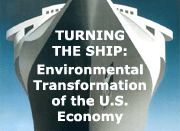Financial Firms Detail Climate Change Risks, Opportunities
 New York and London - Two leading financial institutions, UBS Wealth Management and Lehman Brothers, released reports detailing how companies and individuals might be affected by global warming and what steps they can take to offset the risks.
New York and London - Two leading financial institutions, UBS Wealth Management and Lehman Brothers, released reports detailing how companies and individuals might be affected by global warming and what steps they can take to offset the risks.The UBS report, “Climate Change: Beyond Whether,” breaks down sector-by-sector into detailed key investment opportunities and risks for the individual investors.
Lehman Brothers’ report, “The Business of Climate Change,” warns that companies that do not respond quickly and effectively to changes in the physical and economic environments will face extinction. “The pace of a firm’s adaptation to climate change is likely to prove to be another of the forces that will influence whether, over the next several years, any given firm survives and prospers; or withers and, quite possibly, dies,” the report says.
Klaus Wellershoff and Kurt Reiman of UBS said of their report, “Whether or not you agree with the view that human activity is influencing the climate system is largely irrelevant to the investment thesis. What is important is that numerous policies to combat the threat of global warming are converging to influence people’s behavior, alter the risk profile of various businesses, and improve the investment outlook for others.”
The UBS report found that investors who seek to incorporate climate change risks and opportunities into their portfolios have several options, including:
- Equity-related strategies include underweighting sectors, industries and companies that are highly carbon-intensive and have little potential to adapt to new technologies;
- Investment in companies exposed to renewable and low-carbon energy production and energy efficiency;
- Investment in theme funds focusing specifically on climate-change mitigation;
- Socially responsible investment (SRI) funds and indices that follow one of three approaches: one that includes only the best companies, one that excludes laggards in the field, and one that focuses on the highest improvement potential
“What effect do higher sea level, more frequent bad weather, storm surges, reduced rainfall in some regions, increased rainfall in others, have?” he explained. “What does it mean for the types of product that will be demanded; what does it mean for the sorts of places where you should be producing; the sorts of places that you should be sourcing materials from?”
The UBS report explains that winners and losers from climate change are not always obvious, but that industries whose operations depend on climate conditions have a high level of physical exposure, as do sectors whose operations would be interrupted by extreme weather events. Some examples of the most at-risk sectors include agriculture, fisheries, forestry, water utilities, and water-intensive operations, but also tourism, healthcare, insurance, and operations sensitive to storms, such as offshore oil drilling.
Some risks companies face from future climate change events include heightened regulation, increased impairment of physical property, loss of revenues and erosion of reputation, individually or in combination. But the report makes clear that companies and industries most at risk of negative effects from global warming are also best positioned to benefit from changing regulations that may arise.
Two broad categories of opportunities are detailed in the UBS report: products and processes that deliver improved energy efficiency, and development of renewable/low-carbon energy sources.
You can return to the main Market News page, or press the Back button on your browser.

